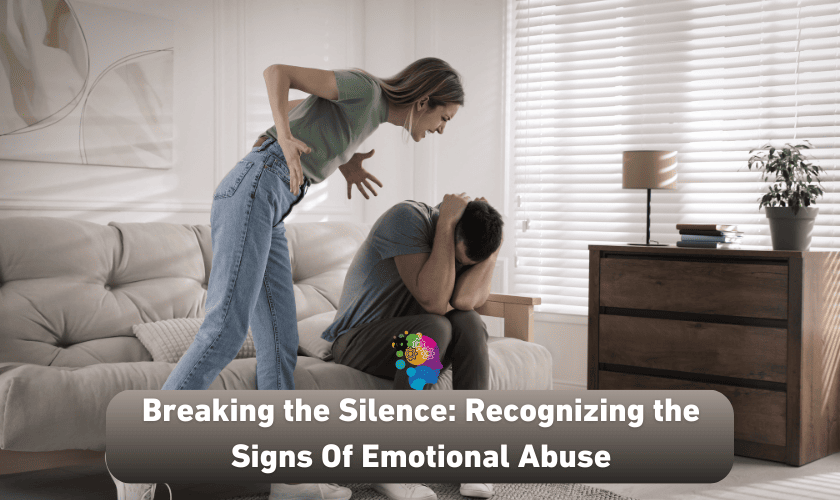In today's fast-paced world, finding moments of mindfulness can be a challenge. Embracing "The Power of Now"...

Emotional abuse is when someone makes another person feel bad on the inside, like how physical abuse can hurt on the outside. It can be hard to spot because it doesn't leave visible marks like bruises. Some people might not realize they are experiencing emotional abuse, so they don't seek help.
It's super important to know the signs of emotional abuse, like when someone always puts you down or tries to control you. Learning about these signs is the first step to get help, talk to someone about it, and stop the abuse from happening.
Emotional abuse is when someone hurts your feelings on purpose. It can happen with words, when someone makes you do things you don't want to do, or when someone doesn't let you interact with people close to you.
If you learn to recognize these behaviors, you can start to protect yourself from them. [1]

Emotional abuse can be sneaky and hard to notice. It unfolds gradually, so the people it affects might not recognize it immediately. Others don't take it seriously since it doesn't leave any bruises. That's why it's essential to know and remember the warning signs.

Research shows that emotional abuse can be just as bad as physical abuse. An emotionally abusive relationship leaves invisible wounds;
The long-term effects of emotional abuse can be severe and impact a person's mental health. Victims may experience depression, anxiety, and even PTSD. It's essential to recognize these effects and seek help to heal from the damage caused by emotional abuse.[4]

Emotional abuse at work means that someone is being mean or hurtful to others, making the workplace unhappy. It can manifest as bullying, belittling, manipulation, excessive criticism, financial manipulation, or even isolation. This abuse can make people stressed, depressed, and not want to come to work.
Because of this, companies need to pay attention to and stop emotional abuse. They should ensure everyone is respected, people can talk openly about their problems, and everyone supports each other. This way, the workplace can be a happy and safe place for everyone to do their best work. [5]
Emotional abuse between friends means that sometimes a friend can be mean or hurtful, and it's not always easy to notice. They might criticize, use mean words, lie, or purposely leave someone out. It's important to recognize when this occurs so the person experiencing the hurt can learn to stand up for themselves and seek kind and supportive friends.
This kind of mean behavior isn't okay. It's important to recognize when this occurs so the affected person can learn to stand up for themselves and find kind and supportive friends. Every person deserves friends who help them feel happy, safe, and valued. [6]
Finding support is vital when dealing with emotional abuse. Confide in trusted friends or family members, join support groups, or seek professional help from a therapist. Establishing a strong support network can make a significant difference in the healing process.
One option for seeking professional help is online therapy. It provides convenient and accessible support for individuals experiencing emotional abuse. To learn more, visit our affiliate partner's website: Online Therapy.
Knowing the signs of emotional abuse is essential to stop it from happening. If you or someone you care about is going through this, it's okay to ask for help and support.
We'd love to hear your thoughts on getting help - you can tell us in the comments below. Let's discuss how online therapy can be an excellent way to deal with emotional abuse.
If you or someone you know is experiencing emotional abuse, it is important to reach out for help. This can include talking to a trusted friend or family member, seeing a mental health professional, or contacting agencies like the National Domestic Violence Hotline.
Coping with emotional abuse can include self-care activities such as spending time outdoors, engaging in creative projects, or connecting with supportive people. Also, creating boundaries and maintaining open communication can be essential for protecting yourself from further harm. We also recommend seeking professional help.
⚠️Disclaimer: The information provided on this health blog is for informational purposes only and is not intended as a substitute for professional medical advice, diagnosis, or treatment. Always seek the advice of your physician or other qualified health provider with any questions you may have regarding a medical condition.
You must be logged in to post a comment.
In today's fast-paced world, finding moments of mindfulness can be a challenge. Embracing "The Power of Now"...
In our fast-paced world, finding moments of tranquility can be a challenge. Meditation apps offer a convenient...
In our fast-paced world, taking time for self-reflection and mindfulness is essential for well-being. Journaling can be...
In today’s fast-paced world, managing stress has become an essential aspect of maintaining overall well-being. Two popular...
Dissociation can be a challenging experience, especially the one that happens at work. Are you experiencing dissociation?...
Bionic reading transforms the reading experience for ADHD individuals by guiding the eyes for focus and understanding. Dive into the world of bionic reading.
Explore the complexities of postpartum depression and genetics in our blog 'Is Postpartum Depression Hereditary?' for insights into maternal mental health.

[…] SPEAK TO AN ONLINE THERAPISTGet 20% off […]
[…] Emotional Abuse […]
[…] abuse is a form of emotional abuse that uses words to hurt the victim. For example, it can include insults, name-calling, […]